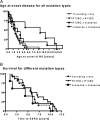Specific podocin mutations correlate with age of onset in steroid-resistant nephrotic syndrome
- PMID: 18216321
- PMCID: PMC2396749
- DOI: 10.1681/ASN.2007040452
Specific podocin mutations correlate with age of onset in steroid-resistant nephrotic syndrome
Abstract
Mutations in the gene encoding podocin (NPHS2) cause autosomal recessive steroid-resistant nephrotic syndrome (SRNS). For addressing the possibility of a genotype-phenotype correlation between podocin mutations and age of onset, a worldwide cohort of 430 patients from 404 different families with SRNS were screened by direct sequencing. Recessive podocin mutations were present in 18.1% (73 of 404) of families with SRNS, and 69.9% of these mutations were nonsense, frameshift, or homozygous R138Q. Patients with these mutations manifested symptoms at a significantly earlier age (mean onset <1.75 years) than any other patient group, with or without podocin mutations, in this study (mean onset >4.17 yr). All but one patient affected by truncating or homozygous R138Q mutations developed SRNS before 6 yr of age. Patient groups with other recessive podocin mutations, with single heterozygous podocin mutations, with sequence variants, and with no podocin changes could not be distinguished from each other on the basis of age of onset. In conclusion, nephrotic syndrome in children with truncating or homozygous R138Q mutations manifests predominantly before 6 yr of life, and the onset of disease is significantly earlier than for any other podocin mutations. Because the age of onset can vary by several years among those with identical mutations, additional factors may modify the phenotype.
Figures

Comment in
-
Podocyte-specific gene mutations are coming of age.J Am Soc Nephrol. 2008 Feb;19(2):190-1. doi: 10.1681/ASN.2007121341. Epub 2008 Jan 23. J Am Soc Nephrol. 2008. PMID: 18216304 No abstract available.
References
-
- Ruf RG, Lichtenberger A, Karle SM, Haas JP, Anacleto FE, Schultheiss M, Zalewski I, Imm A, Ruf EM, Mucha B, Bagga A, Neuhaus T, Fuchshuber A, Bakkaloglu A, Hildebrandt APN: Patients with mutations in NPHS2 (Podocin) do not respond to standard steroid treatment of nephrotic syndrome. J Am Soc Nephrol 15: 722–732, 2004 - PubMed
-
- Kestila M, Lenkkeri U, Mannikko M, Lamerdin J, McCready P, Putaala H, Ruotsalainen V, Morita T, Nissinen M, Herva R, Kashtan CE, Peltonen L, Holmberg C, Olsen A, Tryggvason K: Positionally cloned gene for a novel glomerular protein—nephrin—is mutated in congenital nephrotic syndrome. Mol Cell 4: 575–582, 1998 - PubMed
-
- Boute N, Gribouval O, Roselli S, Benessy F, Lee H, Fuchshuber A, Dahan K, Gubler MC, Niaudet P, Antignac C: NPHS2, encoding the glomerular protein podocin, is mutated in autosomal recessive steroid-resistant nephrotic syndrome. Nat Genet 24: 349–354, 2000 - PubMed
-
- Hasselbacher K, Wiggins RC, Matejas V, Hinkes B, Mucha B, Hoskins BE, Ozaltin, Nürnberg G, Becker C, Hangan D, Pohl M, Kuwertz-Bröcking E, Griebel M, Schumacher V, Royer-Pokora B, Bakkaloglu A, Nürnberg P, Zenker M, Hildebrandt F: Recessive missense mutations in LAMB2 as a cause of isolated and non-Pierson type congenital nephrotic syndrome. Kidney Int 70: 1008–1012, 2006 - PubMed
-
- Zenker M, Aigner T, Wendler O, Tralau T, Muntefering H, Fenski R, Pitz S, Schumacher V, Royer-Pokora B, Wuhl E, Cochat P, Bouvier R, Kraus C, Mark K, Dötsch J, Rascher W, Maruniak-Chudek I, Lennert T, Neumann LM, Reis A: Human laminin beta2 deficiency causes congenital nephrosis with mesangial sclerosis and distinct eye abnormalities. Hum Mol Genet 13: 2625–2632, 2004 - PubMed
Publication types
MeSH terms
Substances
Grants and funding
LinkOut - more resources
Full Text Sources
Other Literature Sources

